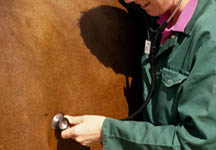British-based riders who compete their horses in Europe must remain vigilant if the UK is to remain free of Equine Infectious Anaemia (EIA or swamp fever).
A veterinary assessment by Defra has found there is a “very low” overall risk of EIA being spread in the UK from horses that have visited infected areas. But the risk rises to “medium” if horses visit Europe between April and October, when flies, which transmit the disease, are most active.
The disease is circulating in Italy and Romania, but there were three cases reported in the UK last year (news, 21 April, 2010).
UK chief veterinary officer Nigel Gibbens said: “Competing with horses in endemic areas like Italy has its risks and owners have a responsibility to protect the rest of the industry.
“There’s a very low risk but it’s crucial that horses are regularly assessed when they’re abroad and back home, and that any suspicions are reported quickly.”
EIA is transmitted by biting flies and tainted blood products.
Signs include haemorrhages, intermittent fever, swelling of legs and head and anaemia. It can also cause organ failure and death.
The British Equestrian Federation’s Claire Shand told H&H that riders have been briefed on the dangers of EIA. But she feels they are unlikely to spread the disease.
“They all have such scrupulous checks and systems in place and the very best veterinary care for their horses,” she said.
This news story was first published in the current issue of Horse & Hound (7 July, 2011)




